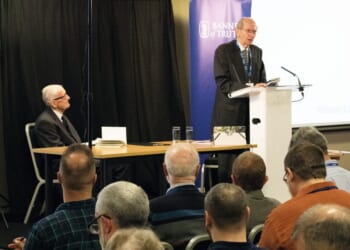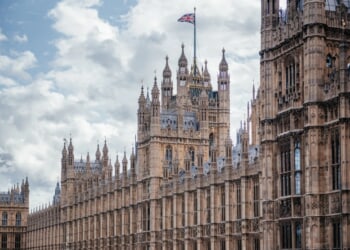Chris Worrall has announced he’s supporting the Conservatives, having been founder of LabourYIMBY and been a long-standing housing advocate and campaigner.
I left school with below-average GCSEs and spent my early twenties changing tyres and taking bets at William Hill. A decade later, I held a first-class degree and a master’s from the University of Cambridge. That kind of leap doesn’t happen by accident. It was made possible by a government that invested in aspiration, through access courses, hardship bursaries, and maintenance grants.
New Labour didn’t just talk about social mobility. It delivered it. I am, quite literally, what the party used to stand for.
The Labour I grew up with saw aspiration as an asset, not a tax target. It understood that ambition wasn’t selfish, it was the engine of national renewal. But today’s Labour, captured by the soft left, has turned its back on that. It talks endlessly about “fairness,” but in practice, it means everyone has to fail equally. Aspiration is treated like a character flaw, while the taxpayer ladles more money into the all-you-can eat buffet of Benefits Britain.
Since 2019, Personal Independence Payment (PIP) claims have doubled, with working-age disability benefit spending now costing £57 billion a year in 2024-25. By 2028, that will rise by another £18 billion, practically another entire police budget. This explosion in health-related benefits is uniquely British. Making us become the world’s welfare village idiot. What should have been a £5 billion saving on disability reform, turned into a £100 million additional bill. After a political U-turn spooked the bond markets. All down to 100 Labour backbenchers would also rather protect winter cruise allowances for millionaire pensioners than fund national defence. A dangerous political class that is not only deeply misguided but sees the House of Commons as an arena to cosplay as working-class saviours.
As I said on GB News: it’s called the Labour Party – not the welfare party. And someone ought to remind the rebels.
But it doesn’t stop at welfare.
Childcare costs are so high that an additional income-tax-paying parent must earn over £60,000 just to cover one child. Divorce within two years of birth is now increasingly common. While the single-breadwinner family model is dead. Britain’s most productive young families are now PAYE pigs milked dry to subsidise mass social housing allocations for low-skilled migrants, many from regions where the likelihood of ever becoming net contributors to the state is vanishingly small.
The tax system doesn’t just squeeze families, it attacks them. Mothers are pushed into work not by choice, but by economic necessity, often at the expense of early childhood attachment. The dream of family life has become unaffordable, largely thanks to politically engineered housing shortages that choke labour mobility and punish young working couples. If they can ever afford to become a couple at all.
I didn’t leave Labour at the first sign of trouble. I stuck with it through Iraq, through the Miliband drift, through the Corbyn catastrophe – when I had no option but to spoil my ballot. I helped reclaim Poplar and Limehouse CLP from hard-left activists who couldn’t even vote to label Hamas a terrorist organisation. These were people who treated extremism like nuance. But when you’re spending more time fighting your own party’s rot than your opponents, you have to ask: what exactly are you defending?
Labour’s problem isn’t caution. It’s drift.
Starmer’s Labour is relapsing into the soft leftism of the Miliband years: sentimental, evasive, and unserious.
It talks tough on fiscal discipline, then caves to pressure from wealthy pensioners. It claims to have a plan for growth, then waters down planning reform. It pledges no new tax rises – while quietly preparing exactly that. This isn’t grown-up politics. It’s focus-group politics, led by a man whose convictions blow with the wind, in a room full of progressive elites who sneer at borders, deride tax reform, and roll their eyes at working-class ambition.
When I stood as Labour’s candidate in Blackwall and Cubitt Town in 2022, I faced a sectarian smear campaign. False accusations labelled me a BNP candidate and an Islamophobe. Despite local journalists finding no protest outside the Mosque, just policeman and me shaking hands with worshippers after Friday prayers. Yet many believe the smear came from within Labour itself, weaponising an old blog in which I’d written about living near a convicted terrorist.
Yet bar a select few, many of my candidate colleagues were too scared to call it out. No “solidarity”. No counter protest. The message was clear: for many in Labour weren’t interested in truth, just internal factional politics.
Despite being tipped for Labour’s mayoral selection next year in Tower Hamlets, it was the party’s defeatist instincts that ultimately baffled me. Tower Hamlets should have been ground zero for a fight against sectarian politics. Instead, Labour fled, abandoning those willing to stand and fight. And the result? A flight of hard-working talent en masse.
Tower Hamlets is a warning.
Sectarianism, intimidation, and identity politics have replaced democratic norms. Community cohesion is collapsing. One local school now reports that none of its pupils speak English as a first language. Is that integration? Or is it a sign multiculturalism has failed. All the while assimilation takes a back seat. And if “diversity is our strength” – what does that make foreign-born mono-culturalism?
But it doesn’t have to be this way. Denmark tackled parallel societies through strong borders and civic integration. Sweden’s Settlement Act makes asylum seekers wait two years for social housing. France, under Macron, imposed a five-year wait for welfare access for non-EU non-workers, and 2.5 years even for working migrants. These measures haven’t collapsed society, they’ve strengthened it.
Meanwhile, Labour can’t even say the word integration without flinching. Across Europe, pragmatic centre-left parties are doing what Labour won’t. And in Britain, it’s the Conservatives—Kemi Badenoch, Robert Jenrick, and Onward’s Sir Simon Clarke, who in my opinion are now leading the charge.
Take Angela Rayner’s tone-deaf response to Sir Trevor Phillips, who asked whether housing targets were realistic given immigration levels. Her reply? “There is plenty of housing already, just not enough for the people who need it.”
But who exactly are those people?
Ask whether British veterans or working-class families should be prioritised, and you risk being labelled a fascist. But Phillips was right to ask. Just the Afghan resettlement scheme alone will house 38,000 people—equivalent to nearly 7,000 homes on typical Afghan households of 5.5. That’s over three years’ worth of Britain’s current social housing output. And that’s before we talk about small boats or legal migration.
Labour refuses to consider the cost, economic, social, or cultural. Conservatives, by contrast, are beginning to face facts. Onward’s Full House report shows high net migration, combined with an inelastic housing supply, is driving up rents and pricing out British families. Even obtaining ethnicity data on offenders is now apparently beyond the pale for Labour. Honest, data-led policymaking is why I came to realise: this party is no longer my home.
Planning reform was once championed by Robert Jenrick, whose white paper led by Jack Airey acknowledged the brutal reality of land economics. Labour eventually embraced some form of it.
As founder of Labour YIMBY, I battled against “Developer’s Charter” smears and pushed planning reform as a growth strategy. Rachel Reeves echoed that message, until Labour pulled the plug. A government minister recently called the U-turn on the Planning and Infrastructure Bill a “win-win,” just days after appearing at a CPRE event. CPRE, whose alumni include suspended MP Chris Hinchliff, would rather protect hedgerows than house young families.
Hinchliff, a self-professed socialist darling of the progressive vegetable lobby, had just published an article calling for Labour to stand up to “vested interests.” Yet he championed more power for unaccountable quangos like Natural England, who is now proposed to wield veto power through new “Environmental Delivery Plans.” This is governance by unelected lawyers and activist bureaucrats. Britain is no longer governed by the rule of law, but by the rule of lawyers, who lick their lips at the prospect of juicy high-cost judicial reviews.
Labour had a chance to change Britain. But they blew it.
I hope I am wrong, but every last flicker of hope has been all but extinguished in Labour’s YIMBY movement. Yet those ideas still live on in the Conservatives. Conservative YIMBY has had more impact in its fledgling few weeks and months, pushing more amendments and policy ideas, which touch on immigration, and further anyone else. It brings the purpose and momentum the pro-housing movement needs to challenge today’s anti-development lobby and entrenched social housing interests.
I spent years fighting the Corbynistas, only for Starmer to reward them with cabinet seats. Labour today rewards rebels and punishes loyalists. It’s no longer a vehicle for aspirational working people. For we are the PIP and asylum seeker PAYEpigs. Instead, it appears more homely for a self-satisfied privileged elite who’ve never had to budget for a nursery bill, fight a hundred hours a week to pay a mortgage, or defend their beliefs against anti-white smears.
I didn’t leave the Labour Party because it changed. I left because it refused to.



![Former Bravo Star Charged After Violent Assault Using a Rock-Filled Sock in Tennessee Walmart [WATCH]](https://www.right2024.com/wp-content/uploads/2025/07/Former-Bravo-Star-Charged-After-Violent-Assault-Using-a-Rock-Filled-350x250.jpg)



![Illegal Alien Walked Free After Decapitating Woman, Abusing Corpse for Weeks [WATCH]](https://www.right2024.com/wp-content/uploads/2025/07/1753013138_Illegal-Alien-Walked-Free-After-Decapitating-Woman-Abusing-Corpse-for-350x250.jpg)
![NYC Man Snatches Child Off The Sidewalk, Parents Chase Him Down [WATCH]](https://www.right2024.com/wp-content/uploads/2025/07/NYC-Man-Snatches-Child-Off-The-Sidewalk-Parents-Chase-Him-350x250.jpg)
![Man Arrested After Screaming at Senators During Big Beautiful Bill Debate [WATCH]](https://www.right2024.com/wp-content/uploads/2025/06/Man-Arrested-After-Screaming-at-Senators-During-Big-Beautiful-Bill-350x250.jpg)

![Karoline Leavitt Levels CNN's Kaitlan Collins and Other Legacy Media Reporters [WATCH]](https://www.right2024.com/wp-content/uploads/2025/07/Karoline-Leavitt-Levels-CNNs-Kaitlan-Collins-and-Other-Legacy-Media-350x250.jpg)





